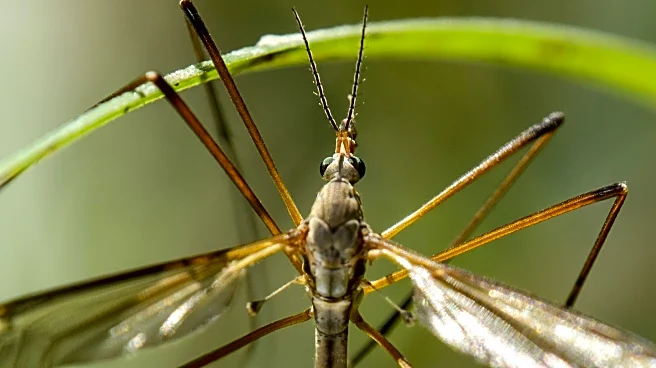What's Happening?
A study conducted by Dutch scientists at Radboud University Nijmegen has revealed that mosquitoes are more attracted to individuals who consume beer, avoid sunscreen, and share their bed. The research was carried out at the Lowlands music festival in the Netherlands, where a pop-up lab was set up to observe mosquito behavior. Participants were asked about their diet, hygiene, and behavior, and their arms were placed in a box with mosquitoes to record attraction levels. The study found that beer drinkers were 1.35 times more attractive to mosquitoes, which are drawn to the scent rather than the alcohol itself. The research suggests that body odor changes due to alcohol consumption and activities like dancing may increase mosquito attraction.
Why It's Important?
The findings of this study have implications for public health, particularly in regions where mosquito-borne diseases are prevalent. Understanding the factors that increase mosquito attraction can help in developing better prevention strategies. Individuals who consume alcohol and engage in activities that alter body odor may be at higher risk of mosquito bites, potentially leading to increased exposure to diseases such as malaria and dengue fever. This research highlights the importance of personal hygiene and the use of protective measures like sunscreen to reduce mosquito attraction and mitigate health risks.
What's Next?
Further research is needed to confirm these findings across a more diverse population, as the current study was limited to festival attendees who tend to be younger and healthier. Expanding the study to different demographics and settings could provide more comprehensive insights into mosquito attraction patterns. Additionally, public health campaigns may focus on educating individuals about the importance of hygiene and protective measures to reduce mosquito bites. Researchers may also explore the development of new repellents or strategies that target the specific scents that attract mosquitoes.
Beyond the Headlines
The study raises questions about the cultural and lifestyle factors that influence mosquito attraction. It suggests that social behaviors, such as attending festivals and consuming alcohol, may inadvertently increase exposure to mosquito bites. This could lead to discussions on how lifestyle choices impact health risks and the importance of balancing social activities with preventive measures. The research also underscores the need for innovative approaches to mosquito control that consider behavioral and environmental factors.









